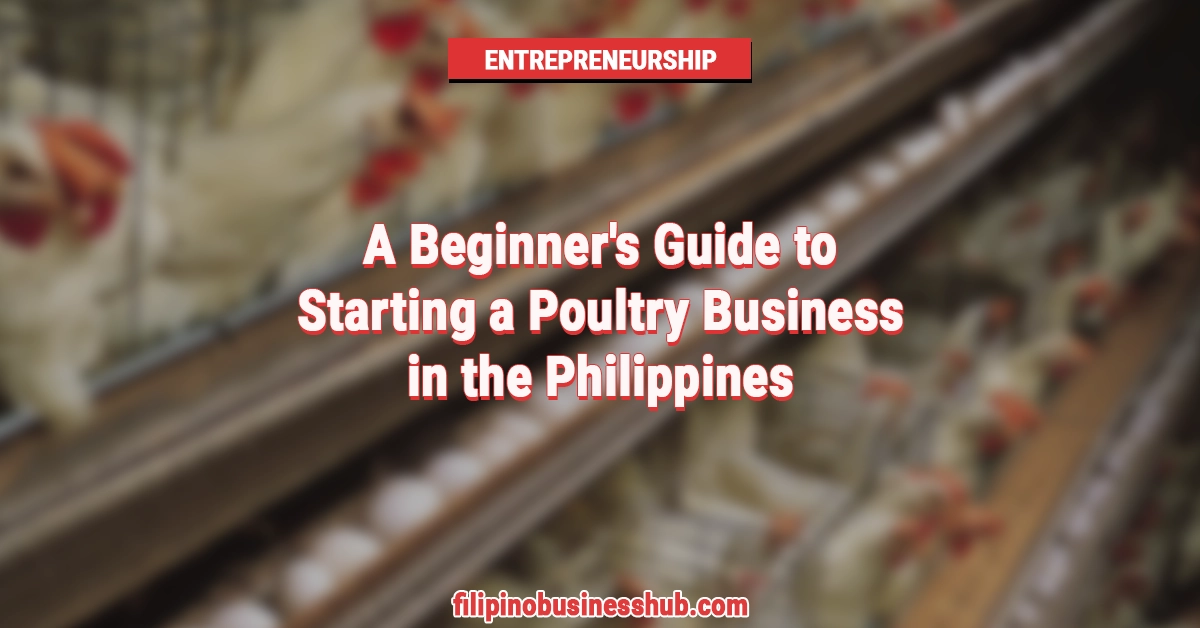A Beginner’s Guide to Starting a Poultry Business in the Philippines
The poultry industry plays a crucial role in the Philippines’ economy, providing a significant source of livelihood and food for its citizens. Demand for poultry products has steadily grown nationwide, providing entrepreneurs with an attractive opportunity to enter this sector.
Starting a poultry business provides many advantages, from low startup costs and fast returns on investment to scaleability. With the proper knowledge and strategies, starting a poultry business in the Philippines can be a profitable and satisfying venture. We will assist beginner poultry entrepreneurs on how to start a poultry enterprise, from understanding farming to managing and marketing products. This article provides basic steps to starting a poultry business in the Philippines.
Table of Contents
Understanding Poultry Farming
What is a Poultry Farm?
If you are considering starting a poultry farming business in the Philippines, it is essential to understand what exactly poultry farming entails. Poultry farming involves breeding, raising, and managing domesticated birds such as chickens, ducks, turkeys and geese for their meat, eggs and feathers.
Poultry farming is a complex industry requiring knowledge in areas like animal husbandry, nutrition, biosecurity and disease control. For its success, poultry farming demands careful planning, effective management and attention to every detail.
Philippine poultry farming has become an extremely profitable agricultural enterprise due to the high demand for poultry products within the nation’s economy, creating employment opportunities and income sources for many Filipinos.
Different Types of Poultry Farming
There are different types of poultry farming in the Philippines that you can start. Here are a few:
Free-range Farming
Free-range farming refers to raising birds in natural environments where they can roam freely and look for food on their own. This technique is popular among small-scale farmers and is known for producing top-quality meat and eggs.
Organic Farming
Organic farming is a form of farming that uses natural and organic methods to produce high-quality poultry products. Organic farmers generally avoid synthetic pesticides, antibiotics and genetically modified feeds to produce these high-demand items for sale to health-conscious customers.
Commercial Farming
Commercial farming refers to intensive production systems designed to maximize output and profit, using highly controlled environments and state-of-the-art equipment to achieve high productivity levels. Large-scale poultry companies commonly utilize this approach.
Backyard Farming
Backyard farming is the practice of conducting small-scale poultry farming within residential environments. This form of agriculture is common in rural regions and allows families to produce meat and eggs for personal consumption or sale at local markets.
Specialty Farming
Specialty farming is the practice of raising poultry tailored explicitly for specific markets, such as heritage breeds, game birds or quail. Such specialty poultry products often command higher prices due to their distinct taste and rarity.
Key Factors to Consider Before Starting a Poultry Farm
Before starting a poultry farm, there are several key factors to consider:
Type of Poultry Farming
First, determine which form of poultry farming best matches your goals, budget, and resources. Consider the types mentioned above of poultry farming as part of this decision-making process.
Location of the Poultry Farm
When selecting a site for poultry farming, consider the availability of land and water supplies and accessibility to markets and suppliers. Make sure it suits the farm’s purpose and is accessible to your target market.
Size of the Poultry Farm
Determine the size, type, and number of birds you can comfortably raise on your farm. Consider factors like space, labor costs, and resources when selecting the size of your farm.
Cost of Inputs
Calculate the costs associated with feed, equipment and labor as well as any necessary inputs such as vaccines or medicines before setting the price for your poultry products. Be sure to consider production costs when setting prices.
Legal Requirements
Become familiarised with the legal requirements for setting up and operating a poultry farm in the Philippines. Obtain any necessary permits and licenses, and adhere to government regulations regarding biosecurity, animal welfare, and environmental protection.
Market Demand
Assess the demand for poultry products in your target market and the potential profitability. Conduct market research to ascertain consumer preferences, trends and competition.
Before beginning a poultry farm in the Philippines, you can make informed decisions and increase the chance of success in this industry by considering these key elements.
Starting a Poultry Farm in the Philippines
Once you understand the basics of poultry farming and have carefully considered all key considerations, it’s time to start planning your farm. Here, we provide a step-by-step guide to establishing one in the Philippines.
Step 1: Attend Training and Seminars on Poultry Farming
Before establishing a poultry farm in the Philippines, it is crucial to acquire knowledge and expertise on raising healthy birds while managing a successful poultry farm. Therefore, attend training or seminar on poultry farming for expert insight on breeds, housing options, feeding needs, disease prevention techniques and management practices, which will enable you to make more informed decisions when starting and running a successful operation. However, if you have enough knowledge about poultry farming, you can skip this step and move on to the next one.
Step 2: Choose a Suitable Location for the Poultry Farm
Consider factors such as availability of land, accessibility, water supply, and environmental conditions when locating your poultry farm. It must also be accessible to target markets.
Step 3: Obtain Necessary Permits and Licenses
Before establishing a poultry farm, all necessary permits and licenses from government agencies must be secured. This may include the following.
- Business Registration – To ensure the legality and legitimacy of your poultry business, registration with either the Department of Trade and Industry (DTI) or the Securities and Exchange Commission (SEC) should occur as soon as possible.
- Mayor’s Permit / Sanitary Permit – To comply with local health and safety regulations, and your poultry farm requires a permit from its local government unit (LGU). A Mayor’s Permit or Sanitary Permit from your LGU should ensure compliance.
- Barangay Clearance – You should obtain a Barangay Clearance from the barangay where your poultry farm is situated to ensure compliance with local laws and regulations. This document ensures your business complies with them.
- Tax Identification Number, SSS, Pagibig, Philhealth for Hiring Employees – When Hiring Employees for your poultry farm, registering it with the Bureau of Internal Revenue and providing employees with Social Security System benefits is mandatory. Therefore, you should obtain your Tax Identification Number from them before beginning operations to comply with government requirements while also offering benefits to employees.
- Permit for Construction – Before starting construction on your poultry farm, obtaining a building permit from the LGU (local government unit) where your poultry farm is situated is important in ensuring its construction complies with building code standards.
- Environmental Clearance – To operate legally and sustainably, poultry farms require an Environmental Compliance Certificate from the Department of Environment and Natural Resources (DENR). This document verifies that your operation does not compromise environmental laws and regulations.
- Animal Health Certification – To maintain compliance with animal health standards and avoid disease outbreaks and pest infestation, poultry farmers need a Veterinary Health Certificate from the Bureau of Animal Industry (BAI). This document verifies that their farm is free from parasites, disease, and pests and meets health standards for poultry farming operations
Noting the specific requirements and procedures of obtaining permits and licenses vary based on your location and the size of your poultry farm, it’s advisable to contact any relevant government agencies in your area to ensure you comply with all regulations.
Step 4: Identify Target Markets and Customers
Determine your target markets and customers and demand for poultry products, then conduct market research to ascertain consumer preferences, trends, and competition.
Step 5: Determine the Type and Size of Your Poultry Farm
Determine the type of poultry farming that best matches your goals, resources and budget. Consider factors like space requirements, labor requirements and available resources when establishing the size and scope of your farm.
Step 6: Purchase Necessary Equipment and Supplies
Get all the equipment and supplies needed for a poultry farm, such as housing, feeding and watering systems, incubators and vaccines.
Step 7: Hire Employees (if necessary)
As part of managing a poultry farm successfully, hiring employees such as farmhands, veterinarians, and administrative staff may prove essential.
Starting a poultry farm business in the Philippines can be profitable and fulfilling, provided you follow these steps and exert enough work and effort into it. By following them and investing your best effort into them, your chances of success in this field can increase substantially.
Managing a Poultry Farm in the Philippines
Once your poultry farm has been established, effective management is crucial to its success. Here are some best practices for poultry farming in the Philippines:
Raising Healthy Birds
Healthy birds are vital to running an effective poultry farm. Please make sure they’re free from disease and parasites, access clean water sources, and are properly ventilated.
Feed and Nutrition Management
Proper nutrition is crucial to your birds’ growth and well-being, so ensure they receive an appropriately balanced diet, including all essential nutrients.
Disease Prevention and Control
To ensure the success of your poultry farm, biosecurity measures should be implemented to thwart disease transmission and entry.
Flies Control Methods for Poultry Farms
Flies are a severe nuisance on poultry farms, so effective fly control methods such as using fly traps, maintaining proper sanitation practices, and keeping surrounding areas free of debris are necessary to combat their presence.
Implementing these best practices will ensure your poultry farm runs efficiently and your birds remain healthy and productive.
Costs of Starting a Poultry Farm in the Philippines
Starting a poultry farm involves a significant investment, so all expenses associated with setting one up in the Philippines must be clearly understood. Here is an outline of the costs involved with starting one:
Equipment
Equipment costs will depend on the size and type of poultry farm you run, such as incubators, brooders, feeders, waterers and nest boxes that will be needed.
Land
The cost of land can depend on its location and size and any special considerations such as drainage. When selecting your plot of land, it must be easily accessible, with good drainage that does not lead to pollution issues, as this will ultimately be less costly overall.
Labor
The labor cost will depend on how many employees you need. For example, you will require workers for cleaning, feeding and monitoring the health of your birds.
Apart from equipment, land and labor expenses, it would be best to consider the expenses related to securing all necessary permits and licenses. While processing costs for such documents may differ depending on your local government unit’s regulations, here are some of the more frequently required licenses and their estimated costs:
- Business Registration (DTI) – around PHP 200 to PHP 2,000 depending on the territorial scope of your business:
- Barangay: ₱200
- City/Municipality: ₱530
- Regional: ₱1,030
- National: ₱2,030
- Mayor’s Permit / Sanitary Permit – around PHP 500 to PHP 5,000
- Tax Identification Number (TIN), Social Security System (SSS), Pag-IBIG, and PhilHealth for hiring employees – varies depending on the number of employees and salary bracket
To save money when starting up a poultry farm, here are a few essential tips:
- Start Small – To minimize initial startup costs and expand gradually as your business develops, begin with only a handful of birds and gradually add more over time.
- Purchase Used Equipment – Consider purchasing used equipment instead of new ones to save money.
- Negotiate Prices – When purchasing supplies and equipment, negotiate prices with suppliers for the best deals.
By carefully planning and budgeting, you can minimize the costs of starting a poultry farm and ensure the long-term profitability of your business.
Marketing Your Poultry Products
Once your poultry farm has been established and your products produced, the next step should be marketing them. Here are some essential steps:
Identifying Potential Buyers
To effectively target your market and understand their needs and preferences. Your target buyers could include supermarkets, wet markets, restaurants, hotels or households as potential clients.
Creating a Brand Identity for Your Poultry Business
When creating a brand identity for your poultry business, create a name, logo and tagline that accurately represent its products – this helps your business stand out and establishes brand recognition.
Setting Prices for Your Products
When setting prices for poultry products, consider production costs, market demand and competitors’ prices. Then, be sure to set reasonable and profitable prices.
Developing Marketing Strategies to Promote Your Poultry Products
To reach your target market, employ various strategies like social media, advertising and promotions, as well as participating in trade shows and events to showcase your products and network with potential buyers.
Marketing is an integral component of business, and it’s crucial that businesses continually assess and adapt their strategies to remain competitive in the marketplace.
Final Tips
Starting a poultry business in the Philippines can be highly profitable if done right. As noted in this beginner’s guide, there are various key considerations when starting a poultry farm, including attending training and seminars, obtaining necessary licenses and permits and identifying target markets and customers.
Managing a farm is crucial to raising healthy birds, avoiding disease outbreaks and controlling flies. Furthermore, an effective marketing plan will allow your products to gain more exposure while establishing brand recognition within your business.
Establishing a poultry farm may come with associated expenses, but you can save money through smart investments, government programs, and subsidies. With careful planning and hard work, new entrepreneurs can enter this thriving industry in the Philippines and reap its many rewards.






